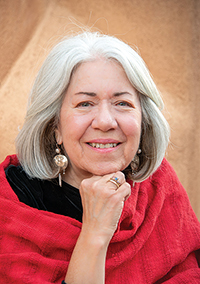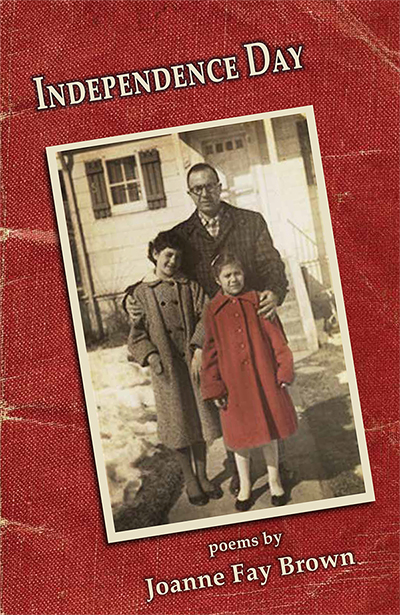Independence Day
poems by
Joanne Fay Brown
~40 pages, ISBN: 978-1-964277-27-1, $13 (+ shipping)
Release Date: January, 2025
The Advance Sale Discount price on this title has expired. For those who prefer to pay by check, the price is $18/book (which includes shipping & sales tax) and should be sent to: Main Street Rag, 12180 Skyview Drive, Edinboro, PA 16412
PLEASE NOTE: Ordering in advance of the release date entitles the buyer to a discount. It does not mean the book will ship before the date posted above and the price only applies to copies ordered through the Main Street Rag Online Bookstore.
 Joanne Fay Brown was born into a family of Old Leftists in Baltimore during the 1950s scourge of the “McCarthy Era” blacklists; her father was blacklisted the year of her birth. She came of age amid civil rights and countercultural movements, political assassinations and anti-war protests. The poems in Independence Day, reflect her experience during those historical times and her growing beyond them. She is an Amherst Writers & Artists instructor, offering a workshop — Write to Heal— for cancer patients and survivors. Joanne lives with her husband Rod and two dogs in Santa Fe and Albuquerque, New Mexico.
Joanne Fay Brown was born into a family of Old Leftists in Baltimore during the 1950s scourge of the “McCarthy Era” blacklists; her father was blacklisted the year of her birth. She came of age amid civil rights and countercultural movements, political assassinations and anti-war protests. The poems in Independence Day, reflect her experience during those historical times and her growing beyond them. She is an Amherst Writers & Artists instructor, offering a workshop — Write to Heal— for cancer patients and survivors. Joanne lives with her husband Rod and two dogs in Santa Fe and Albuquerque, New Mexico.
The poems in Joanne Brown’s Independence Day evoke the pain and disappointment felt by many who worked in the 1950s and 1960s for a kinder, better United States. The “FBI visits, the blacklist . . . / those who named names” profoundly affected the poet and her family. But the arc of these beautifully crafted poems — including the poet’s spiritual quest and travels in Mexico — leads us on a redemptive journey to healing and love. ~Caroline Cottom, author of Asylum
To read this book of beautiful and revealing poetry is to go on Joanne Brown’s life journey with her. And like her, these poems are brimming with courage and openheartedness in the midst of life’s powerful and painful struggles. I was enrapt. ~Rev. Patricia de Jong
Brown’s fresh and inviting voice portrays her family, the McCarthy era, Viet Nam, the social and political moments of the 50’s and 60’ & the dreaming child versus the activist parents. She wonders if she’s pretty, wishes for a boyfriend or a Ladybug sweater; the poems use wonderful details, portray an important era, remind us to see deeply, and climb forward into a new life, one of spirit and love. The book’s a pleasure. ~Veronica Golos
Ode to American Communists
1935 – 1965
On the sidewalk soapbox in East Flatbush
my mother called out lines from leaflets
by the Young Communist League,
collar of her brown woolen coat
buttoned tightly against the chill. Some,
carrying bags of herring, sour pickles, sweet cream
and strawberries, stopped to listen
as the sky grew dim and the lights came on
Workers Unite!
And they did, for a while, like bright coins
in a purse make a dollar.
There was some good in it
in the textile mills, steelworks,
actors’ studios, government bureaus
and there was a family feeling
around the table, set with borscht
where they tossed their hot-potato opinions,
their urgent, high-pitched bickering
fists hitting the table.
They’d read “The Communist Manifesto,”
they took the Fifth Amendment
they did not name names
though there were jobs at stake,
kids to feed.
Small ancillary soldiers, we sat
at the ends of the table, eating our kugel in silence.
One of the hard-liners sat opposite me
am I blocking your view? he snapped, as I looked
in the mirror behind his head. Fifteen and not keen
on dialectical materialism,
I’d been wondering if I was pretty.
Red Diaper Babies
Like Ukrainian nesting dolls
we belonged to our parents
our parents to the Old Left
always a table set in winter with brisket and noodle kugel
in summer macaroni salad and lemonade
at dusk under the white ash, Dottie’s coffee cakes
our parents knew what was right for the world
upheld a kind of Marxism
but they didn’t tell us
about FBI visits, the blacklist, the underground,
the neighbors who crossed the street to avoid a greeting,
those who named names
they didn’t tell us
their secrets told us
my father’s horn-rimmed glasses caught the sun’s last rays
we children felt highborn, we made plans
the crawlspace behind the attic bookcase
was a good place to hide.
Complicated
Three friends lost their fathers this week.
One built a TV empire, another custom wood cabinets,
the third planted a vineyard.
The women were proud of their fathers’ ingenuity.
The mogul’s daughter held a sponge to her father’s parched lips,
the cabinet maker’s daughter changed her father’s bedclothes,
the vintner’s daughter worried her father would suffer
from cancer, but he died mysteriously, found by the FedEx man.
When my turn came, I visited the hospice where my father
lay unresponsive, gaunt, fingers pointing upward. I struggled.
He built a successful pest-control business in our basement,
McCarthy’s blacklist having worked its poison on him
that he worked on me.
I am a man without a country — his rage
smoldered, burned.


 Joanne Fay Brown was born into a family of Old Leftists in Baltimore during the 1950s scourge of the “McCarthy Era” blacklists; her father was blacklisted the year of her birth. She came of age amid civil rights and countercultural movements, political assassinations and anti-war protests. The poems in Independence Day, reflect her experience during those historical times and her growing beyond them. She is an Amherst Writers & Artists instructor, offering a workshop — Write to Heal— for cancer patients and survivors. Joanne lives with her husband Rod and two dogs in Santa Fe and Albuquerque, New Mexico.
Joanne Fay Brown was born into a family of Old Leftists in Baltimore during the 1950s scourge of the “McCarthy Era” blacklists; her father was blacklisted the year of her birth. She came of age amid civil rights and countercultural movements, political assassinations and anti-war protests. The poems in Independence Day, reflect her experience during those historical times and her growing beyond them. She is an Amherst Writers & Artists instructor, offering a workshop — Write to Heal— for cancer patients and survivors. Joanne lives with her husband Rod and two dogs in Santa Fe and Albuquerque, New Mexico.